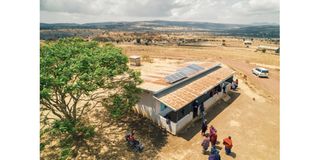Restoring Power, Restoring Dignity: Jamila’s story from the frontlines of rural health

What you need to know:
- Her story is far from unique. Across Tanzania—and much of Sub-Saharan Africa—healthcare workers endure similar constraints. According to the World Health Organization (2021), 60% of health facilities in the region lack reliable electricity, while 25% have no power access at all. The consequences are far-reaching: compromised vaccine storage, unsafe deliveries, impaired emergency care, and fragile patient safety.
In the quiet expanse of rural Dodoma—where the sun slips behind acacia trees and dusty roads stretch beyond the horizon—health workers stand as unsung heroes, holding the fragile line between life and loss.
They are often the first, and sometimes the only, point of care for thousands.
For years, they’ve worked in near-invisible conditions—without electricity, without essential tools, and often without the safety, dignity, or recognition they deserve.
For Jamila Cathbert Mselemu, a nurse at Ombiri Dispensary, delivering babies under torchlight wasn’t an occasional inconvenience—it was the nightly reality.
“We used torches to deliver babies at night,” she recounts, her voice laced with both resolve and a quiet frustration. Ombiri Dispensary serves over 5,900 residents from two surrounding villages. Until recently, it operated without a stable electricity supply.
Her story is far from unique. Across Tanzania—and much of Sub-Saharan Africa—healthcare workers endure similar constraints. According to the World Health Organization (2021), 60% of health facilities in the region lack reliable electricity, while 25% have no power access at all.
The consequences are far-reaching: compromised vaccine storage, unsafe deliveries, impaired emergency care, and fragile patient safety.
Let there be light
But change is now taking root. Thanks to the Kijanisha Afya programme—implemented by the Energy and Livelihoods for Communities (ELICO) Foundation with support from the Embassy of Ireland in Tanzania—clinics like Ombiri are stepping out of the shadows.
Equipped with 5kW hybrid inverters, 6.5kWp solar panels, and 5kWh battery banks, these facilities are gaining more than light—they are regaining dignity and capacity.
At Ombiri, Jamila now works with proper lighting, sterilisation tools, and reliable cold-chain storage for vaccines. “We no longer work in the dark,” she says. “It feels safer—for us, and for our patients.”
A system reimagined
In Makamaka village, the transformation continues. The dispensary, which opened in 2023 without electricity or running water, now uses solar energy to power vaccine fridges, delivery rooms, and equipment charging stations.
Even more revolutionary is the arrival of solar-powered electric motorbikes. These have enabled health workers to reach remote communities with maternal care, immunisation, family planning, and nutrition services.
In a country where the rural health worker-to-population ratio still falls short of the WHO’s recommended 23 per 10,000 (Ministry of Health, 2021), mobility matters. Dr Akwilina Dubee, who heads the Makamaka Dispensary, reflects: “The e-motorbikes have transformed how we work. We can follow up with patients, deliver vaccines, and respond to emergencies. We’re no longer stuck.”
At Rofati Dispensary, Judith Mwakilembe echoes this sentiment. “Before, we had to use our own money or wait days to submit reports. Now, we move quickly and efficiently.” This small shift addresses a big challenge: the invisible burden of logistics and reporting, which, according to a 2020 Ifakara Health Institute study, consumes up to 30% of operational time in rural health facilities due to lack of power, transport, and digital tools.
Safe health workers, safer patients
Behind every safe childbirth, every timely vaccination, every emergency averted, there stands a dedicated health worker. Yet far too often, they operate in environments that compromise their safety and efficiency.
Access to power means more than turning on lights. It ensures sterile conditions, cold storage for medicines, communication tools for emergencies, and equipment to save lives. Most importantly, it brings peace of mind—critical in high-stakes, resource-constrained settings.
Safer working conditions lead to better outcomes, improved morale, and lower burnout—particularly in remote areas where staff shortages are acute. When health workers feel respected, supported, and equipped, they stay longer, serve better, and uplift the communities around them.
More than power—a movement for healing
Kijanisha Afya is not just a project—it’s a movement. It weaves together clean energy, climate resilience, gender equity, and health system reform into one locally grounded initiative.
The programme supports clinics with solar energy systems, energy-efficient appliances, and training for health workers and community members on sustainable power use. It’s not a temporary fix. It’s a model for enduring change.
Help keep the light on
Still, many clinics remain in the dark—waiting, hoping, coping.
Every clinic deserves power. Every nurse deserves light. Every mother deserves a safe delivery. And every rural child deserves a vaccine that hasn’t been compromised.
Your support can help light the next clinic, power the next delivery room, and equip the next health worker.
Let’s keep the light on. Because where the light touches, healing begins.





